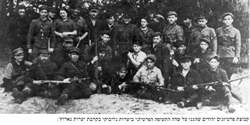I ran into it again just now while I was looking up "Zog Nit Keyn Mol (Never Say)." Zog Nit Keyn Mol was written by Hirsh Glick during the Second World War for the Vilna Partisans, one of the first organized Jewish resistance efforts. (The Partisans story was captured in the 1985 documentary "The Partisans of Vilna", which is available on DVD and will be shown on April 18, 2007 at the Museum of Jewish Heritage)
Zog Nit Keyn Mol is a song of hope, solidarity, and defiance that spread quickly across Europe and then the world.
Back to Passover. I got interested in looking for recordings/lyrics for Zog Nit Keyn Mol after seeing a reference to it in the Shoshana Silberman's "A Family Haggada", the haggadah we used at my cousins seder. I forget where in the seder the reference was made, but the connection was clear and tightly linked to Silberman's inclusion of "Go Down Moses." The messiah hasn't come and the Exodus story isn't over. In every age, as we struggle (we being the Jews, but also the world as a whole) to overcome our bondage, the seder helps keep our hope fresh and our resolve focused. The hour we've hungered for is near! We are here! Next year in Jerusalem.Never say that you are going on your last way
Though leaden clouds may be concealing skies of blue
-Because the hour we have hungered for is near;
And our marching steps will thunder: We are here!
Because the hour we have hungered for is near;
And our marching steps will thunder: We are here!From Zog Nit Keyn Mol by Hirsh Glick, translation by Aaron Kramer "Anthology of Folk Songs," on the web at SaveTheMusic.com.
It is not surprising then that other communities have discovered and resonated with Zog Nit Keyn Mol. And it's not surprising that one of these communities would be African Americans. Specifically, Paul Robeson, the prominent singer and recorder of African American spiritual and folk songs who's version of "Go Down Moses" helped introduce it to an American Jewish audience, also recorded an amazing version of Zog Nit Keyn Mol. According to Robeson's son, quoted in the 2005 in the Toronto Star and cited on Wikipedia.
"My father learned the words to the song from a Warsaw ghetto survivor on his way to Russia... This concert was broadcast live over radio to seven time zones. Imagine somebody goes to the Soviet Union in the midst of an anti-Jewish campaign and at a concert he tells them about the affinity between blacks and Jews. Dad was sending a message to Stalin."
You can hear a long clip from both Robeson's English and Yiddish versions, as well as versions by Theodore Bikel, Jan Peerce, Adrienne Cooper, and others at SaveTheMusic.com.









No comments:
Post a Comment